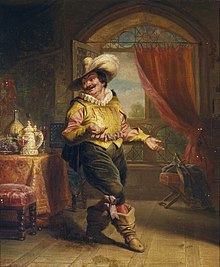Sir Toby Belch
| Sir Toby Belch | |
|---|---|

Oil painting of Sir Toby Belch painted by George Henry Hall
|
|
| Creator | William Shakespeare |
| Play | Twelfth Night |
| Source | Gl'ingannati |
| Family | Olivia (niece) |
| Associates | Sir Andrew Aguecheek |
| Role | Secondary Character |
Sir Toby Belch is a character in William Shakespeare's Twelfth Night, believed to have been written around 1600.
He is considered one of William Shakespeare's finest comic characters, an ambiguous mix of high spirits and low cunning. He first appears in the play's third scene, when he storms onto the stage the morning after a hard night out, complaining about the sombre melancholy that hangs over his niece's household. "What a plague means my niece to take the death of her brother thus? I'm sure care's an enemy to life." This immediately establishes Sir Toby at the opposite pole from the languishing melancholy which dominated the first scene (including Orsino's speech, "If music be the food of love..."), identifying him as a force for vitality, noise and good cheer, as his name suggests. But it also raises the question of how far the audience is expected to sympathize with him. Is his criticism of his niece a justified statement of the old truism that "life must go on", or an insensitive blunder by a hungover old drunkard?
At the beginning Sir Toby appears to be friends with another character, Sir Andrew Aguecheek, a guest of Olivia, Sir Toby's niece. However as the play progresses, it transpires that Sir Toby is just taking advantage of Sir Andrew's riches, one of the more sinister plots of the generally comedic play.
His tormenting of the steward Malvolio is similarly double-edged in its tone of "sportful malice" (V,1). The plot against Malvolio is generally considered a comic highlight of the play, but critics have often complained of its cruelty. The play ends with the quarrel still unresolved, and Olivia warning that Malvolio "hath been most notoriously abused" (V,1).
Whatever his faults, no character study can accuse Sir Toby of snobbishness. Though he taunts Malvolio with the demand "Art any more than a steward?" (II,3), he only does so after Malvolio has threatened him with being turned out if he doesn't reform his ways. Indeed part of Malvolio's complaint is that Sir Toby and his companions are not acting like noblemen by drinking and singing but like "tinkers" in an "alehouse". His appreciation of Maria, though couched in terms that might not please every woman: "She's a beagle, true-bred" (II,3), and eventual marriage, shows that he thinks his title of no particular account compared to his love for her.
In the words of his enemy widow, Sir Toby Belch has "no respect of place, persons, nor time" (II.3). He cannot, or will not, change his behaviour to conform to anything but his own high-spirited impulses for drinking and merry-making. Thus Shakespeare offers him to the audience not as an answer to the problems of love and melancholy in Twelfth Night, but as an alternative spirit, with its own rude energy and boorish flaws.
...
Wikipedia
